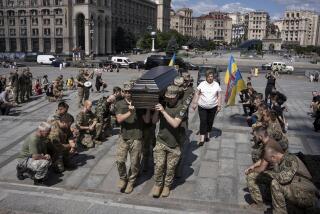Ukraine cease-fire ends with little headway in effort to broker peace
A 10-day cease-fire expired late Monday in Ukraine’s embattled eastern regions despite last-ditch efforts by the leaders of France and Germany to broker an end to the fighting that has taken more than 400 lives.
A statement from Ukrainian President Petro Poroshenko posted on his website about two hours after the cease-fire ended said it wasn’t being extended as the European leaders had requested.
“We will attack and we will free our country,” he said.
Fighting between pro-Russia separatists and Ukrainian government forces was supposed to have halted over the last 10 days after Poroshenko proclaimed a cease-fire to give the militants a chance to lay down their arms and vacate the government facilities they seized in April.
In a two hour telephone conversation Monday, French President Francois Hollande and German Chancellor Angela Merkel appealed to Poroshenko to extend the cease-fire beyond its 10 p.m. [noon PDT] expiration. Russian President Vladimir Putin was also party to the call, the second among the four leaders in as many days.
A French government statement said Hollande and Merkel had urged both the militants and Ukrainian forces to establish a genuine cease-fire and had called for international monitors on the border between Russia and Ukraine to observe any infusion of arms or fighters, which Kiev accuses the Kremlin of sending.
The European leaders also demanded the release of all captives -- more than 200 people have gone missing in separatist-held territory -- and that the separatists and Ukrainian government negotiate a new power-sharing formula between Kiev and the country’s deeply divided regions.
An earlier statement from the Ukrainian presidency said Poroshenko pointed out that the cease-fire he announced as a unilateral gesture was repeatedly violated, despite pledges by some militants to honor it.
Ukrainians angry over the dozens of soldiers killed since the cease-fire took effect protested Sunday outside the presidency, demanding that a military campaign resume to recover control of the eastern regions.
Andriy Lysenko, spokesman for the Ukrainian National Security and Defense Council, said five soldiers were killed in clashes over the weekend and that the separatists had violated the cease-fire eight times in the previous 24 hours.
Russian media reported two civilians killed in artillery shelling in the front-line town of Slovyansk.
A Russian TV cameraman was also killed in the rebel-held Donetsk region. Russia’s state-run Channel One said Anatoly Klyan, 68, died en route to a hospital after being wounded in the stomach when the bus in which he was traveling with other journalists was fired on late Sunday night, as it approached a Ukrainian military base.
The Russian Foreign Ministry issued a statement accusing the Ukrainian troops of murder in Klyan’s death and of deliberately targeting journalists “to prevent attempts to reveal the truth” about the conflict pitting pro-Russia gunmen against government forces.
Russia’s official Itar-Tass news agency said France’s Hollande had called for an investigation of Klyan’s death, and the Organization for Security and Cooperation in Europe lamented that journalists “continue to pay the highest price possible” to report from the increasingly lawless conflict zones. The OSCE report said Klyan and his crew “came under fire while filming near a Ukrainian military compound in the Donetsk region in the early hours” of Monday.
Channel One reported that the bus carrying Klyan was driven by a man in camouflage clothing and that it approached the military base after dark on Sunday night. The bus was reportedly attempting to bring the mothers of conscripts to the base to demand the release of their sons. It was unclear from the television report whether anyone at the base had knowledge of the group’s mission.
Klyan was the fourth Russian journalist killed in eastern Ukraine in recent weeks. A TV reporter and soundman died in shelling of a rebel-held checkpoint near Luhansk on June 18, and a Russian translator and the Italian correspondent with whom he was working were killed in a mortar blast near Slovyansk on May 24.
OSCE teams have been patrolling the violence-racked east for the last three months to observe and report on irregular armed factions operating in violation of a more than 20-year-old treaty to which both Russia and Ukraine are signatories. Two four-man teams monitoring the Luhansk and Donetsk regions were taken captive by the rebels in late May and released in the last three days, reportedly at the Kremlin’s urging.
Merkel and other European Union leaders have threatened a new round of sanctions on Russia if Putin fails to use his influence with the separatists in Ukraine to stop their insurgency. At least 420 people have died since the militants began occupying government buildings, police stations and armories in Donetsk and Luhansk after Russia seized and annexed Ukraine’s Crimean peninsula in March.
The separatist leaders have appealed to Russia to annex their territories, but Putin has ignored them, apparently to avoid a heavier sanctions blow from Western countries seeking to punish his seizing Crimea in violation of international law.
Follow @cjwilliamslat for the latest international news 24/7
More to Read
Sign up for Essential California
The most important California stories and recommendations in your inbox every morning.
You may occasionally receive promotional content from the Los Angeles Times.











